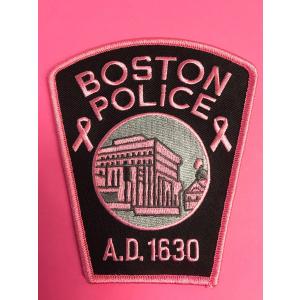Let’s Talk Women Police Officers This Breast Cancer Awareness Month
Across the State of Massachusetts, 122 agencies are supporting Breast Cancer Awareness Month by wearing #pinkpatches and — in many eye-popping cases — driving police cars swathed in pink wraps.
female police officers — a 138-year history of positive change
- Women first entered law enforcement before the turn of the 20th century. “Police matrons,” as they were called, assisted in the care of women and girls held in custody. Boston appointed its first police matron in 1883.
- This year marks the 100th anniversary of the State of Massachusetts authorizing the hiring of female police officers. The Boston Police Department appointed six women on April 21, 1921. Although they were not issued vehicles, uniforms, or weapons, these women still stared down criminals of every sort, often hailing a passing taxi to assist in bringing the bad guy to justice.
- Detective Dorothy E. Harrison (served 1944-1972) was Boston’s first African American woman detective. A trained opera singer, the Boston University graduate felt policing held a better future than music. She quickly showed her chops when, in the first week of service, she disarmed a distraught man, retrieving the gun and flagging a passing patrol car to take her suspect to the station house.
- Kathleen M. O’Toole became the first female commissioner of the Boston Police Department, appointed by Mayor Thomas M. Menino in February 2004.
- This summer, Northampton Police Department rolled out its first all-woman patrol when five female officers covered the midnight shift, a scheduling coincidence that is “certainly possible” to happen again, according to Police Capt. Victor Caputo.
Too few women in law enforcement
Although women have made strides in law enforcement, both nationally and in Massachusetts, fewer than 13% of all uniformed officers are women. The disparity shows itself throughout departments, where 60% of nonuniformed civilian personnel are women. Compare this with the United Kingdom, where 27% of uniformed officers are women. Nearly every European country leads America in this statistic.
The reason? Many recruiters say not enough women apply. Inflexible schedules and recruiting strategies emphasizing SWAT teams and military-style ambushes don’t appeal to most women, they explain.
Goal: 30% by 2030
The National Association of Women Law Enforcement Executives wants to change these statistics by publicly challenging police departments to increase the ranks of women to 30% of the force by 2030. However, more than doubling the number of women patrolling the streets will take rethinking scheduling to accommodate parents, they argue. Other strategies, the organization suggests, include revamping testing and hiring protocols, which unintentionally eliminate or discourage women candidates.
Promoting law enforcement’s community policing responsibilities may attract more young women as well. Good verbal communication skills and innate empathy are critical tools in de-escalating tense situations and avoiding unnecessary violence.
In 1972, Congress passed an amendment to the Civil Rights Act of 1964, prohibiting police agencies from job discrimination based on gender. Title VII, as it is known, opened the door to women joining the ranks of police officers. Now, in 2021, we spy pink police cars supporting research into a disease that overwhelmingly impacts women. With that kind of energy, it is easy to envision a future where female police officers are a common sight in communities across Massachusetts.
The Hundred Club — Serving the Community
At The Hundred Club of Mass., we care for those who care for us. When these everyday people-turned-heroes lose their lives in the line of duty, we are here for their families. We have helped beneficiary families since 1959. Our assistance encompasses college scholarships, financial and legal support, counseling, and enrichment programs. Help us help those who dedicate their lives to serving and protecting our communities. When a police officer or firefighter dies, in many cases, their paycheck and insurance stop before their death benefits begin, which is where the Hundred Club steps in to help. Your generosity provides immediate support to the families of these everyday heroes — funds they can rely upon to pay rent, groceries, and other bills. Help us continue the tradition of caring for those who care for us. Donate to the Survivor Benefits Fund: https://100clubmass.org/donate/

